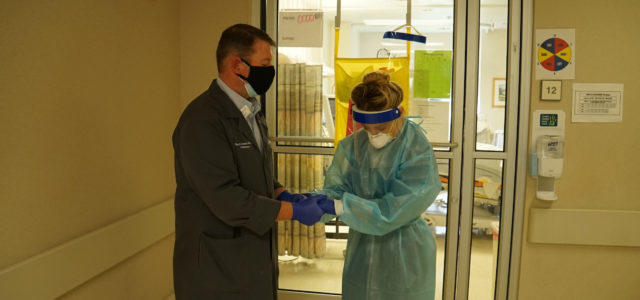
Caption
Rev. Will Runyon, Phoebe’s director of chaplaincy and palliative care prays with nurse Anna Grace Fulmer who works in the Phoebe Putney ICU.
Credit: Georgia Health News

Rev. Will Runyon, Phoebe’s director of chaplaincy and palliative care prays with nurse Anna Grace Fulmer who works in the Phoebe Putney ICU.
The current COVID onslaught may be the worst of the four virus surges in one crucial way: The effect on hospital employee morale.
Leaders of Georgia hospital systems say the latest COVID-19 wave has been very difficult for nurses and other clinical staff partly because it emerged at a time of wide availability of vaccines — and therefore was largely avoidable.
“One thing that is different about the fourth wave of the disease is the visible emotional toll on our front-line providers,’’ said Dr. Danny Branstetter, medical director of Infection Prevention for Wellstar Health System.
“We are 20 months into this pandemic, and nurses, physicians and medical staff have been there for patients and the community day in and day out,’’ Branstetter said. “Another distinction is that we now have a vaccine that can prevent illness, but we continue to see large numbers of people hospitalized by a disease that could have been averted, adding to the frustration and fatigue of medical staff.’’
Many hospitals report that more than 90% of currently hospitalized covid patients are unvaccinated.
COVID-19 hospitalizations in Georgia surpassed the 5,000 mark on Friday, closing in on the state record of 5,700 that was set in January.
Just 42% of Georgia residents are vaccinated, among the lowest rates in the nation.
Cook County in South Georgia has had the highest per capita COVID-19 case increase over the past seven days among U.S. counties, according to New York Times data Friday. Its school system announced it was closing next week due to a high number of student infections.
Nearby, Berrien County has had the eight-highest increase, according to the Times list.
In southwest Georgia, Phoebe Putney Health System reported Friday that it had reached its all-time high number of COVID-19 patients — 199. The system made national news a year and a half ago when it was flooded with virus patients early in the pandemic.
“In the last week, we have seen had a 50% increase in covid inpatients, and unfortunately, we have had nine COVID-19 deaths,” said Scott Steiner, Phoebe Putney Health System president and CEO. “Our resources are being stretched like never before.’’
The staff is feeling frustration, Phoebe officials say.
“In one sense the staff is resilient, but they’re also tired and broken down,’’ said the Rev. Will Runyon, Phoebe’s director of chaplaincy and palliative care. “They don’t see an end in sight. They’re caring for patients who are younger and sicker, and our staff is just exhausted. We need the community to step up and find the compassion they showed us the first time around. They can do that by advocating for the vaccine.”
The Georgia Nurses Association said Friday that many of its members are angry.
“They’re saying it didn’t have to be this way, as bad as it is,’’ said GNA’s CEO, Matt Caseman.
Many hospital nurses have left the profession due to stress from the pandemic, Sharon Pappas, chief nurse executive for Emory Healthcare, told reporters Thursday.
“The current COVID-19 surge is deeply impacting our frontline clinicians, including our nurses, because we know the spread of the virus is preventable,’’ she told GHN. “This surge is making it difficult to provide the most critical care to those in need, and this takes an emotional toll. Our teams are working tirelessly to care for all of our patients, and we hope the community will support them by getting vaccinated.”
The current surge, driven by the delta variant of the virus, has another troubling dimension: the increase in the number of Georgia children infected.
Only one in five Georgians between the ages of 12 and 17 is fully inoculated, according to federal data, The Atlanta Journal-Constitution reported recently.
Dr. Jim Fortenberry, chief medical officer at Children’s Healthcare of Atlanta, describes “a high-stress environment that hasn’t slowed for nearly two years.‘’
“Nurses and doctors are managing the same uncertainties in their personal lives as everyone else — day cares and schools that can go virtual or close at a moment’s notice, or other mental stresses of managing each individual’s own responsibilities in life,’’ he said.
“Additionally, patients and parents are bringing their own stresses into the care environment, escalating the types of interactions we might have had prior to COVID-19.’’
Fortenberry said staff “are now watching patients suffer when their illness could have been prevented. This time around we actually have a vaccine.’’
Vaccinations, he added, are “the only way out of this pandemic.’’
This story comes to GPB through a reporting partnership with Georgia Health News.
